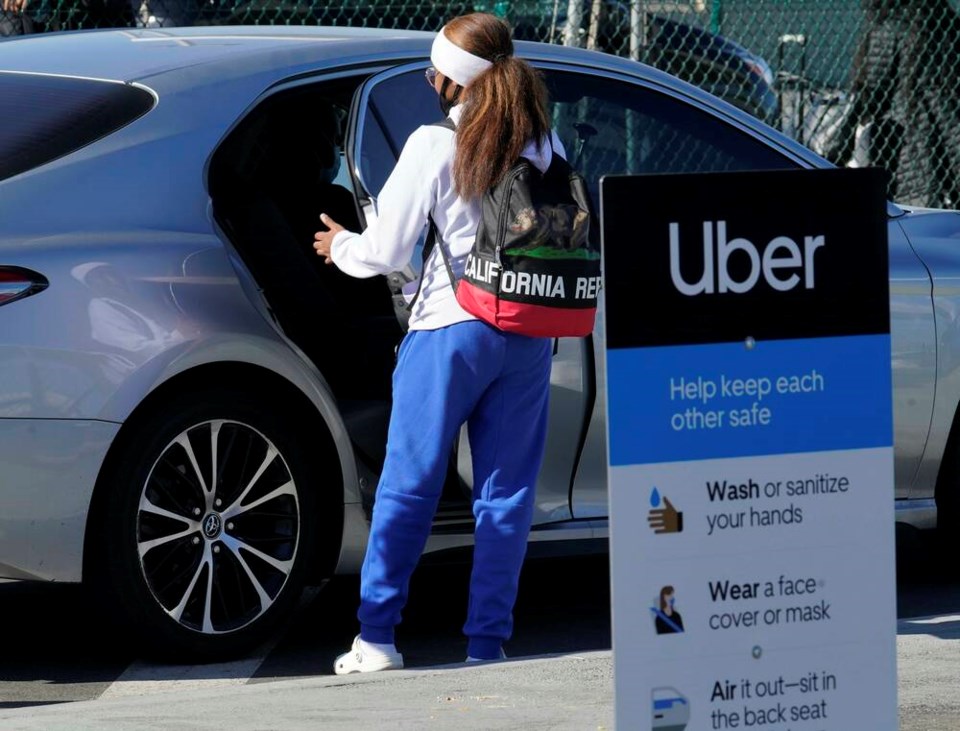Ride-hailing giant Uber says it was surprised by the Passenger Transportation Board’s decision this week to deny its application to operate in Victoria and Kelowna.
Uber, which has been operating in the Lower Mainland and Whistler since January 2020, had been hoping to expand its service area to include all of Vancouver Island and the rest of the province.
“The Passenger Transportation Board’s decision is surprising, disappointing and inconsistent with what we hear from communities like Victoria and Kelowna,” Uber said in a statement to the Times Colonist. “There is meaningful public demand for ridesharing services … and the strong uptake of ridesharing in Metro Vancouver since we launched.”
In its decision, the board, an independent tribunal that considers applications for taxi, bus and limousine licences and what it calls “transportation network services” — also known as ride-hailing — said there was a lack of public need, and Uber’s presence in the market could harm smaller operators and taxis.
“The board is not convinced that there exists a public need for the service applied for,” it wrote in its decision. “Further, the board considers that the application, if granted at this time, would not promote sound economic conditions in the passenger transportation business in B.C.”
But according to Uber, tens of thousands of users have downloaded and opened the company’s software application on smartphones in Victoria and Kelowna over the past year, which, the company says, shows demand for the service. It also noted it has the backing of city councils in Victoria and Langford, both of which wrote letters of support to the board that were included in Uber’s application.
“British Columbians have been clear that they want access to the same safe, reliable rides available in communities around the world,” the company said.
Victoria Mayor Lisa Helps said she was disappointed with the decision. “Victoria’s No. 1 private-sector industry is tech, and tech companies have been advocating for Uber since at least 2017 or earlier,” she said.
Helps said it shouldn’t be a question of taxi versus Uber, since there is room for both. “If the objective is to give people as many alternatives as possible to the single-occupancy vehicle, which is the objective in the city’s climate leadership plan, then we have to create as many options as possible, as soon as possible.”
In its decision, the board referenced a report it commissioned showing ridership dropped significantly through the pandemic.
However, an Uber spokesperson noted the pandemic has not hampered expansion elsewhere. It added services in Winnipeg and Halifax and has seen increased interest from would-be drivers looking to augment their incomes in the past year.
Uber said consumers in cities such as Victoria and Kelowna expect the same services that are available around the world.
But a local firm that has been operating a ride-hailing service in Victoria and Kelowna since April 2020 said the board’s decision is the right one for now.
Mandeep Rana, chief executive of Victoria-based Lucky to Go, said there’s no demand for another player in the market.
“This kind of service did not require another company coming in at the moment. Even we, as a ride-hailing company, have not even been able to fully explore the opportunity due to COVID,” said Rana.
Lucky to Go is one of six companies that have approval to operate as ride-hailing firms in Victoria. But it is the only one doing so. Rana said the reason for that is money — setting up shop is costly when there is very little money coming in.
Rana said Lucky to Go is only now preparing to start offering airport service and approach the Greater Victoria Harbour Authority to handle demand from cruise-ship passengers.
“There’s no ridership right now, just not enough,” he said.
Uber said it will review the board’s decision before deciding on its next steps, be that an appeal or another application.



